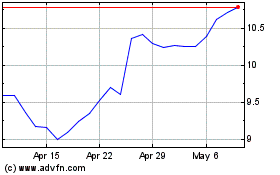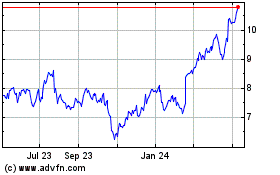Credit Suisse, Barclays Settle 'Dark Pool' Investigations
January 31 2016 - 7:40PM
Dow Jones News
Credit Suisse Group AG and Barclays PLC agreed to pay $154.3
million combined to settle investigations by regulators into their
"dark pools," officials said.
The record settlements are with the U.S. Securities and Exchange
Commission and the New York attorney general. The agencies
announced the agreements in news releases Sunday, after The Wall
Street Journal published a report about the impending
settlements.
"These cases mark the first major victory in the fight against
fraud in dark-pool trading that began when we first sued Barclays:
coordinated and aggressive government action, admissions of
wrongdoing, and meaningful reforms to protect investors from
predatory, high-frequency traders," said Eric T. Schneiderman, the
New York attorney general, in a statement.
"We will continue to take the fight to those who aim to rig the
system and those who look the other way," he said.
The SEC's enforcement chief, Andrew Ceresney, said in a separate
statement said the penalties show "firms pay a steep price when
they mislead subscribers." The SEC alleged that Barclays and Credit
Suisse repeatedly failed to police their trading venues, gave some
clients inaccurate information about the venues and violated SEC
rules aimed at ensuring market fairness and accurate pricing of
securities.
The SEC "will continue to shed light on dark pools to better
protect investors," the agency's chairman, Mary Jo White, said in
the statement.
A Credit Suisse spokeswoman said the bank was "pleased to have
resolved these matters" with the regulators. A Barclays
representative declined to comment.
The agreements are the biggest and second-biggest settlements
related to dark pools, which are privately run stock-trading venues
that have come under greater scrutiny in the past several years.
Regulators and other critics have accused dark pools of providing
unfair advantages to professional traders at the expense of big
institutions.
Previously, the biggest settlement was the $20.3 million that
New York brokerage Investment Technology Group Inc. agreed to pay
the SEC in August. ITG admitted wrongdoing in its case.
Barclays and Credit Suisse each made "false statements and
omissions in connection with the marketing of their respective dark
pools and other high-speed electronic equities trading services,"
the New York attorney general said in his news release.
Under the settlement, Credit Suisse will pay a total of nearly
$85 million—$30 million each to the SEC and New York attorney
general, plus $24.3 million primarily in disgorged revenue and
interest to the SEC.
Credit Suisse neither admitted nor denied the allegations,
according to a person familiar with the matter. The bank's two
trading venues named in the settlements are Crossfinder, one of the
stock market's biggest dark pools; and another, much smaller
platform called Light Pool, which displays bids and offers to sell
stocks like an exchange does but has other characteristics of a
dark pool.
The settlement comes less than a month after Daniel Mathisson,
Credit Suisse's U.S. head of stock trading, said he was leaving the
firm in late February to start a new business in asset management,
The Journal reported in early January. His group oversees the
bank's dark pools.
Barclays will pay about $70 million to settle charges that
include those brought in a high-profile fraud case by the New York
attorney general against Barclays in connection with its dark pools
in June 2014. In that case, the New York attorney general alleged
Barclays misled clients about the extent of high-frequency trading
in its dark pool, called LX.
Barclays admitted to misleading investors and violating
securities laws, and agreed to have an independent monitor review
operations of its electronic-trading division, according to the
statement from the New York attorney general. Half of the amount
Barclays is paying will go the SEC and half to the New York
attorney general.
Both cases center in part on whether the banks misled some
clients about how the bank-owned trading venues prioritized certain
buy and sell orders, including whether they withheld information
that might have led clients to route orders elsewhere.
Wall Street firms have competed fiercely for market share in
stock trading, which generates fees and helps banks garner
information about the markets and sell other products to
clients.
Dark pools originally were created to help buyers and sellers
swap shares with greater anonymity—and sometimes in greater
size—than they could on the stock market. They also help banks cut
costs because they don't have to pay fees to stock exchanges when
trades are executed in their own dark pools.
Aruna Viswanatha and Christopher M. Matthews contributed to this
article.
Write to Bradley Hope at bradley.hope@wsj.com and Jenny
Strasburg at jenny.strasburg@wsj.com
(END) Dow Jones Newswires
January 31, 2016 19:25 ET (00:25 GMT)
Copyright (c) 2016 Dow Jones & Company, Inc.
Barclays (NYSE:BCS)
Historical Stock Chart
From Mar 2024 to Apr 2024

Barclays (NYSE:BCS)
Historical Stock Chart
From Apr 2023 to Apr 2024
